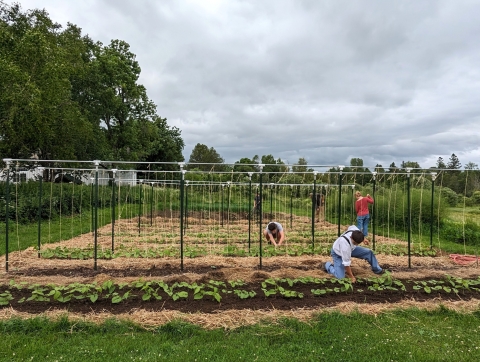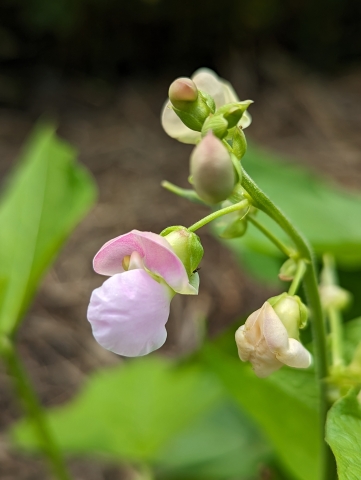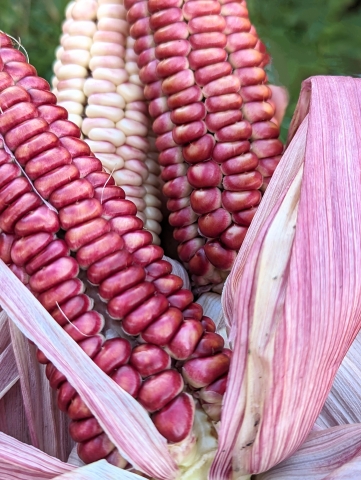Sterling College: Dawnland Heritage Garden and Black River Seed Library
2023 Update:
Coming into our fifth year stewarding the Dawnland Heritage Garden and Black River Seed Library, three main goals have guided our work: the preservation and dissemination of Abenaki seed diversity and associated cultural knowledge and histories; the reproduction of traditional agricultural methods; the enrichment of agricultural education opportunities.

While the ways in which we worked towards these goals have shifted somewhat from what we initially envisioned when applying for the Seedling Grant, we’ve celebrated a successful year and made meaningful changes to ensure the longevity, sustainability, and success of the program!
As an institution, the start of 2023 brought forth a curricular revisioning and restructuring to address the changes and challenges facing liberal arts colleges across the country and ensure Sterling is in a solid and sustainable position moving forward. While this shift has been beneficial for us as a whole, it brought with it changes to our curricular calendar, thus impacting hands on the ground and the tangible ways we tend the seeds in our care. For example, the new Intensives and block schedule means some classes meet for just a month instead of across a full semester in fall and spring. Additionally, shifting to offering just one major means that students are no longer required to participate in the summer Field School as they were when we offered the Sustainable Agriculture & Food Systems major. While a more modest number of students may still choose an Internship with the farm and gardens during the summer in the 2024 season, there will no longer be a consistent crew to tend the Heritage Garden throughout the peak growing season. As such, we thoughtfully adjusted garden plans and infrastructure to create systems which could successfully accommodate these changes. This meant scaling back the expansion of certain growing spaces while also investing in more efficient use of existing spaces for seed production.

Additionally, insights from the end of the 2022 growing season highlighted the need for improved infrastructure for pest management and disease pressure. While crop loss due to pests and illness is always a challenge for farmers, the impacts can be particularly deterimental to Sterling’s work tending rare, indigenous, landrace, and heritage seed varieties.
With these changes and challenges in mind, we utilized funds from the Seeding Grant to acquire tools, equipment, and infrastructure to manage pests and disease and to streamline daily management. Intensive mulching and a new silage tarp helped with weed management and allowed us to maintain a tidy and functional space despite the changes to working hands in the garden. Electronet fencing proved invaluable in keeping deer and raccoons out of the gardens, resulting in a bountiful and unharmed harvest of Abenaki Rose corn. Our new trellising not only made care of our crops easier, but the improved airflow drastically reduced fungal pressure even though we experienced an exceptionally wet season with unprecedented flooding. In fact, this season was our most productive for bean crops ever and we have a wonderfully replenished seed stock of five indigenous varieties. The new trellising was also a huge improvement for growing out the Dawnland Bottlegourd, a crop which is critically at risk of disappearing.
Our community and education work in the Dawnland Heritage Garden was also quite successful. Students across four different courses, Independent Studies and Senior Year Research Projects (SYRPs) were deeply involved in the stewardship of the garden. The 2023 summer Field School students, for example, expanded our growing area by building traditional Abenaki mounds to grow the Three Sisters. They also installed the new garden infrastructure and kept detailed records of each seed crop throughout the growing season, including research into the cultural history and significance of each crop. We developed some of this information into educational signage which allowed visitors to the gardens to learn about the crops. Additionally, recognizing the impacts of climate change on each growing season and the scarcity of information about cultivating these crops, we decided to compile our notes and research into a printed guide to keep in the Sterling library and share with our Abenaki partners. By compiling this information yearly, we hope to document key changes, challenges and opportunities for growing these regionally adapted seed crops. We’re currently in the process of formatting this work and plan to have the printed copies available at the start of the New Year! While we previously envisioned crafting educational materials, the Seedling Grant has helped us bring these ideas to fruition since we did not ultimately receive funding from another grant for which we were a finalist.

Thanks to support from the Seedling Grant, we were also able to acquire new seed cleaning equipment and storage containers which improved our efficiency and allowed us to engage more students in the process as well. The student utilizing the garden for her Senior Year Research Project inventoried the entire seed collection and the new storage system allows us to maintain the new organization system she established. Since we had such an abundant growing season, expanding the volume of the seed collection substantially, we opted to wait on purchasing our new cryo-storage so we could accurately assess how much space we need once all seed is cleaned. We’re excited to bring in this piece of equipment soon! Additionally, the exceptionally wet fall highlighted the importance of better drying conditions, post-harvest, to manage fungal pressure during the seed drying process. As such, we’ve decided to utilize some of the funds to purchase a low-temp dehydrator which will allow us to quickly and safely dry the wet-processed squash seeds and other crops like corn, which otherwise hold moisture in the cob for a long time.
All in all, 2023 has been the most prolific and educationally engaging growing season yet. There is a deep satisfaction in witnessing moments of awe from students as they winnow seeds for the first time, mesmerized by the magic of mass and a gentle breeze. Seeing these crops from seed to seed, learning seed stories, and sharing a meal from the harvest transforms the concept of seed sovereignty into a tangible experience. The rich conversations shared over a bin full of beans, many sets of hands rhythmically shelling as we go, remind us that seed work is community work and stewardship is relational.
2022 Grant Amount: $7,500
Sterling College and its students support the Abenaki in planning for the impacts of climate change on tribal lands such as the risk for loss of traditional foodstuff plants, the climate-friendly propagation of indigenous crop varieties, and contributes both seed stock and lightly-processed indigenous crops to the Nulhegan Band of the Coosuk Abenaki Nation. This is all done in order to assure the perpetuation of Traditional Ecological Knowledge. This is achieved through Sterling College’s Dawnland Heritage Garden and Black River Seed Library, its supporting role in land management on tribal lands, and its partnership with Abenaki Helping Abenaki. This project seeks not only to preserve rare and often highly-endangered crop varieties indigenous to the Northeast, but to get them in the gardens and on the plates of tribal members, and, more generally, to educate the broader public about their historical and contemporary importance. This grant request will enable 50 students and their faculty in our Sustainable Agriculture & Food Systems program to engage in a 5th year of serving the 1,400 members of the Nulhegan Band in VT by conserving, propagating, and sharing indigenous seeds as invited by the Abenaki. Our work supports food sovereignty and access for the original inhabitants of the land on which the College operates and uses techniques that minimize and mitigate impacts on climate change.
Our work is at the direction of Chief Stevens for the Nulhegan Band of the Coosuk Abenaki Nation and with guidance and cooperation from other indigenous leaders in Vermont. Indigenous-run organizations involved in the project include Seeds of Renewal, Abenaki Helping Abenaki, and the Vermont Indigenous Heritage Center.
Work under the proposed grant will commence upon receipt of funding in Spring 2023 and continue through the 2023 and 2024 growing and harvesting seasons. New plantings will be established in Spring 2023, with public events - including a harvest event and blessing (tentatively October) and two subsequent events - scheduled for the following spring and summer.
Since 1900, ~75% of crop genetic diversity has been lost. Traditional diets have been replaced with commodity foods, and native peoples have experienced a surge in diet-related diseases - they are 2.5 times more likely to be diagnosed with diabetes than their white counterparts, for example. Sterling responds to these crises through its role as a seed saver, traditional culinary revivalist, educator, and food sovereignty advocate working toward local resilience and dietary decolonization. The Dawnland Heritage Garden and Black River Seed Library is the first seed library in Vermont that specifically highlights the importance of rematriating native seeds in Vermont.
Sterling will help fill a critical gap in Abenaki food sovereignty by serving as the repository and conservator of indigenous, landrace, and heritage seed varieties specific to the Wabanaki Confederacy at the invitation of the tribal peoples. A Co-op Seedling Grant will enable Sterling to improve its seed storage and processing facilities, expand the number of crops planted, implement a public education initiative, host events in collaboration with the tribe, and serve as a testing center oriented toward traditional varieties and climate change resilience, thus establishing the first seed conservation hub serving Vermont and Maine.